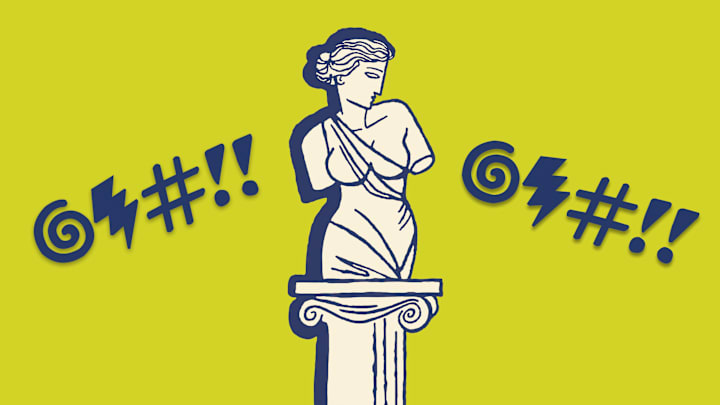Curse tablets, known to researchers as defixiones, were a popular form of expression in the Roman Empire from the 5th century BCE to the 5th century CE. More than 1500 tablets—inscribed in Latin or Greek, and scribbled on bits of recycled metal, pottery, and rock—have been found from Britain to north Africa, sealed with nails and hidden away in graves, wells, and natural springs. Many are so formulaic that it’s thought they were written by professional scribes who sidelined as curse-writers, and whose words, it was believed, would imbue the tablets with magic.
Used by commoners and the elite alike, the little notes revealed what many Romans really wanted the gods to do to their enemies: The garden-variety curse would ask the gods to “bind” someone else’s body to strip them of their power. Others addressed retribution, theft, love, and even sports. Some of the more inventive could be used in our 21st-century lives—just swap out the Roman names and use your imagination to get dark magic to do your bidding.
1. “Old, Like Putrid Gore”
Curse: Vetus quomodo sanies signeficatur Tacita deficta.
Translation: “Tacita, hereby accursed, is labelled old like putrid gore.”
No one knows what Tacita did, but it must have been quite heinous to warrant a curse this serious. Discovered in a grave in Roman Britain dating to the early 2nd century CE, this curse was written backwards on a lead tablet, perhaps to make it more potent.
2. “Be Unable to Chain Bears”

Curse: Inplicate lacinia Vincentzo Tzaritzoni, ut urssos ligare non possit, omni urssum perdat, non occidere possit in die Merccuri in omni ora iam iam, cito cito, facite!
Translation: “Entangle the nets of Vincenzus Zarizo, may he be unable to chain bears, may he lose with every bear, may he be unable to kill a bear on Wednesday, in any hour, now, now, quickly, quickly, make it happen!”
This curse is aimed at gladiator Vincenzus Zarizo, who fought in Carthage, North Africa, in the 2nd century CE. The author of the curse presumably had some money riding on Zarizo’s bear fight.
3. “Lose Their Minds and Eyes”
Curse: Docimedis perdidit manicilia dua qui illas involavit ut mentes suas perdat et oculos suos in fano ubi destinat.
Translation: “Docimedis has lost two gloves and asks that the thief responsible should lose their minds and eyes in the goddess’s temple.”
Poor Docimedis was just trying to enjoy a nice soak at Aquae Sulis, now known as Roman Bath in Somerset, UK, when someone made off with his gloves. This tablet dates to the 2nd-4th centuries CE and comes from a large cache of curses relating to bathhouse thefts, which were apparently rampant.
4. “May the Worms, Cancer, and Maggots Penetrate”

Curse: Humanum quis sustulit Verionis palliolum sive res illius, qui illius minus fecit, ut illius mentes, memorias deiectas sive mulierem sive eas, cuius Verionis res minus fecit, ut illius manus, caput, pedes vermes, cancer, vermitudo interet, membra medullas illius interet.
Translation: “The human who stole Verio’s cloak or his things, who deprived him of his property, may he be bereft of his mind and memory, be it a woman or those who deprived Verio of his property, may the worms, cancer, and maggots penetrate his hands, head, feet, as well as his limbs and marrows.”
This is an especially nasty curse on the culprit who stole Verio’s clothes, because being devoured by worms was seen as a particularly gruesome, undignified death. The tablet was found near Frankfurt, Germany and dated to the 1st century CE.
5. “Be Struck Dumb”
Curse: Qui mihi Vilbiam involavit sic liquat comodo aqua. Ell[…] muta qui eam involavit.
Translation: “May the person who carried off Vilbia from me become liquid as the water. May she who has so obscenely devoured her be struck dumb.”
This partially broken lead tablet refers to the “theft” of a woman named Vilbia by an unknown person; whether Vilbia was the curse-giver’s girlfriend, concubine, or slave is unclear. It was also found at Roman Bath.
6. “Kill the Horses”

Curse: Adiuro te demon, quicunque es, et demando tibi ex hanc hora, ex hanc die, ex hoc momento, ut equos prasini et albi crucies, occidas et agitatores Clarum et Felicem et Primulum et Romanum occidas.
Translation: “I implore you, spirit, whoever you are, and I command you to torment and kill the horses of the green and white teams from this hour on, from this day on, and to kill Clarus, Felix, Primulus, and Romanus, the charioteers.”
The most frequently cursed animals on these tablets were horses, given their importance in chariot races. This particular curse comes from Hadrumetum (in modern day Tunisia) from the 3rd century CE, and the side opposite the curse included a crude depiction of an anatomically correct deity, presumably to aid in ensuring the rival teams failed.
7. “Never do Better than the Mime”
Curse: Sosio de Eumolpo mimo ne enituisse poteat. Ebria vi monam agere nequeati in eqoleo.
Translation: “Sosio must never do better than the mime Eumolpos. He must not be able to play the role of a married woman in a fit of drunkenness on a young horse.”
This tablet wishes ill on an actor named Sosio. In Roman comedic theater, apparently the “drunk woman on a horse” was a common joke, so the person making the curse hopes that Sosio’s stand-up routine will fall flat. It was found at the site of Rauranum in western France and dates to the late 3rd century CE.
A version of this story ran in 2018; it has been updated for 2023.
